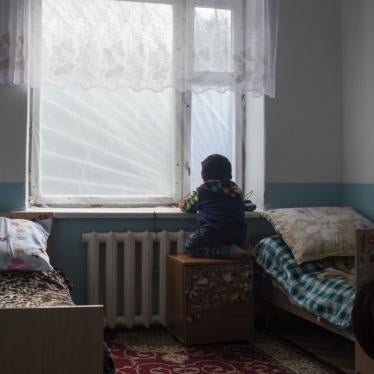(New York) – The Croatian government should urgently heed the calls by United Nations disability rights experts to improve its disability rights record, Human Rights Watch said today. On April 17, 2015, the UN Committee on the Rights of Persons with Disabilities recommended that the Croatian government should do more to protect the rights of people with disabilities, including legal reform and ensuring that everyone with a disability who is in an institution has the opportunity to move into the community.
“The UN review leaves no doubt about the steps Croatia has to take to protect the rights of people with disabilities,” said Shantha Rau Barriga, disability rights director at Human Rights Watch. “The question now is whether the Croatian government will act quickly to carry out these reforms.”
The committee, a UN monitoring body consisting of 18 independent experts, scrutinized Croatia’s record on disability rights as part of its mandate to review governments’ compliance with the Convention on the Rights of Persons with Disabilities. Croatia has been a party to this treaty since 2008, and the committee review was a response to Croatia’s initial report to the committee.
While the committee recognized that the Croatian government has made some progress in protecting the rights of people with disabilities, domestic legislation still does not fully reflect a human rights model, the committee found. It directed the Croatian government to initiate a comprehensive review of existing legislation and bring it in line with the treaty.
Although Croatia has a “deinstitutionalization” plan to move people out of residential institutions and reintegrate them into the community, the committee criticized Croatia for excluding private institutions, wards for long-term care in psychiatric institutions, and foster homes for adults from those efforts. Human Rights Watch found that more than 8,200 people in Croatia remain in segregated institutions, many of them without their consent. In particular, the committee voiced concern about the “high rate of child abandonment and institutionalization of children with disabilities.”
“The Croatian government needs to step up its efforts to ensure that everyone with disabilities trapped in state or private institutions, long-term care in psychiatric hospitals, and foster homes without their consent is part of the deinstitutionalization process,” Barriga said. “Croatia should invest in community-based housing and support so people with disabilities can live on their own with dignity.”
The committee also raised concerns about one of the most fundamental aspects of the treaty: the right to legal capacity. Human Rights Watch research found that roughly 18,000 people with intellectual or psychosocial disabilities are placed under guardianship in Croatia, and denied their legal capacity – the right to make decisions about basic rights, such as to marry and form a family, to sign an employment contract, or to hold property. A significant majority live under full guardianship, under which guardians – often nominated by the state – make all decisions for them.
The committee urged the Croatian government to abolish this guardianship regime and “provide a wide range of measures which respect a person’s autonomy, will and preferences, including with respect to a person’s right, to give and withdraw their own individual informed consent for medical treatment, to access justice, to vote, to marry, to full parental rights, and to work.” It also recommended taking tangible steps to introduce systems for supported decision making, such as training social workers, legal professionals, and public authorities on the rights the treaty enshrines.
The committee urged Croatia to repeal laws that permit involuntary commitment of people with psychosocial and intellectual disabilities. The committee also raised concerns about “the frequent use of involuntary treatment and restraint measures as well as other forms of degrading treatment” and said Croatia should immediately end involuntary treatment and the use of restraint measures.
In 2010 and 2014, Human Rights Watch documented abuses of the rights of people with disabilities in Croatia, including many cases of prolonged detention without consent, treatment without consent, prolonged seclusion, and the use of physical and chemical restraints. Human Rights Watch remains concerned that the newly adopted Croatian Mental Health Law does not require written consent for treatment if the person is deemed “not capable” of giving their consent and the treatment is judged to be in their “best interests.”
The committee said the Croatian government should prohibit the sterilization of people with disabilities without the person’s free and informed consent and provide people with disabilities with support to make informed choices and decisions regarding medical procedures and interventions. The country’s Mental Health Law permits sterilizations if parents or guardians make the request.
“The committee’s assessment serves as a stark reminder of the many shortcomings that mark the Croatian government’s disability rights record,” Barriga said. “The UN committee has provided a clear road map for reforms, and Croatia, the newest EU member state, should quickly carry out its recommendations.”








